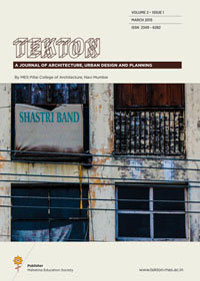Sustainable Urbanism
Pallavi Dalal
Tekton
Volume 2, Issue 1, March 2015
pp. 110 – 111
Sustainable Urbanism
Pallavi Dalal
Tekton
Volume 2, Issue 1, March 2015
pp. 110 – 111
One of the most striking features of urbanisation is its dynamic nature. This is due to varying intermittent phases of the process whereby human society moves from being predominantly rural to being largely urban. Henrik Valeur in his book “India: The Urban Transition – A Case Study of Development Urbanism” talks about the factors affecting this transition citing mainly Chandigarh and Bangalore as examples.
Henrik Valeur is a Danish architect-urbanist based in Copenhagen. He is concerned about ever-increasing consumption leading to exhaustion of natural resources, disruption of eco-systems and reduction of biodiversity, besides the production of hazardous waste and greenhouse gasses contributing to global climate change. Valeur is a selfconfessed Indophile, during his visits to India, he has collaborated with architecture schools, city authorities, planners and NGOs mainly in Chandigarh and Bangalore. He has compiled his experiences and outcomes of studies in a form of this book with fresh perspective towards these two Indian cities.
In his book, Valeur foregrounds his concerns about air pollution, contamination and depletion of freshwater resources, lack of proper housing, environmental and human

India: The Urban Transition A Case Study of Development Urbanism
Author:
Henrik Valeur
Publisher:
The Architectural Publisher B (2014)
Pages:
344
Price:
EUR 30
TEKTON JOURNAL ISSUES

Editorial
Papers & Essays
Moving Along: Following Cows in Changing Indian Cities
Rebecca Hui
Inclusive Cities: Towards Gender-Sensitive Urban India
Sudnya Mahimkar and V. A. Gokhale
Resilient Slums: Role of Social Capital
Deepika Andavarapu and Mahyar Arefi
Expressions of Modernity: Semiotic Isotopy on Bombay’s Backbay Reclamation Buildings
Mustansir Dalvi
Writing the City – Shaping its Conscience
Kaiwan Mehta
Practice
A Project’s Journey
Kamu Iyer
Dialogue
Development Urbanism: Issues and Possibilities
Henrik Valeur in Conversation with Richa Sharma
Book Review
Sustainable Urbanism
“India: The Urban Transition – a Case Study of Development Urbanism”
by Henrik Valeur, The Architectural Publisher B, 2014
Pallavi Dalal
